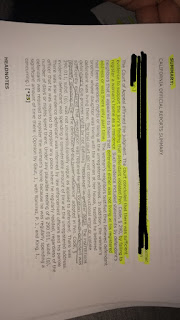-What are you most proud of in your block presentation and/or your senior project? Why?
- What I'm most proud of about my senior project is the amount of time and effort I put into my project. I spent so much time on my research and watching cases to develop my answers. There was times that I struggled, like with finding a mentor but I put so much effort into this project. I am very proud of myself and it's a big accomplishment for me. It was a great experience all together and definitely taught me a lot about the career field that I want to pursue later on.
(2) Questions to Consider
-a. What assessment would you give yourself on your block presentation? Use the component contract to defend that assessment.
AE P AP CR NC
- I would give myself a P. I presented myself well and knew a lot of information on my topic and presented that as well. I showed my intuition and tied in my answers to myself. Also, I met the talking time requirements and the overall time requirements. I brought posters props and everyone enjoyed my activity and said I did a wonderful job. In all honestly, I would give myself an AE but I feel a little insecure saying that I deserve an AE if I really don't.
AE P AP CR NC(3) What worked for you in your senior project?
- Again I would give myself a P because I spent a lot of time on my project and I had to go through three mentors so that was a bit of a struggle. I did my work, I missed a few assignments, not gonna lie, I definitely don't deserve an AE because of those assignments but I don't deserve a CR because of them either. I soent many hours on my independent components as well which were fun. So I think I did proficiently overall in my senior project.
(3) What worked for you in your senior project?
- I think what worked well for me was the areas I could explore within my topic. I got to look into different fields of law and how they related to my topic. Also the amount of things I could do for my independent components was cast as well. And being able to work on all these cases and take notes and sit in on meetings at my mentorship was so fun to me and made me like my topic even more.
- If I had a time machine I would find a mentor that actually stuck with me. Having to keep finding new mentors was hard because each one I emailed had a different reason on why they couldn't be my mentor. I would also not procrastinate and keep up with my research checks and maybe taken a psychology class at Cal Poly because it played such a big role in my answer one and throughout my topic.
(5) Finding Value
-How has the senior project been helpful to you in your future endeavors? Be specific and use examples.
- My project has taught me A LOT about criminal prosecution and the field of law in general. Law is a career I want to pursue so being able to get this experience before even going into study law will help me during school and after. Also, being able to build up my reputation in the law community opened up doors and opportunities for summer internships at law firms. My mentor said she would continue to be my mentor as long as I want. So this will help me in all my future endeavors in my career of law.










